The Children, Youth and Families Act 2005: Mandatory Reporting
VerifiedAdded on 2022/10/17
|5
|716
|11
Report
AI Summary
This report provides an overview of mandatory reporting laws in Victoria, specifically focusing on the Children, Youth and Families Act 2005. It details the development of the law, its objectives in promoting child welfare, and the historical context involving previous acts. The report outlines the responsibilities of professionals, including health experts, teachers, and police, in reporting suspected cases of child abuse and neglect. It also describes the reporting procedures, emphasizing the importance of phone calls and the protection of confidentiality. Furthermore, the report addresses ethical principles related to mandatory reporting, such as misinformation, parental involvement, and professional dilemmas, providing a comprehensive understanding of the legal framework and its implications.
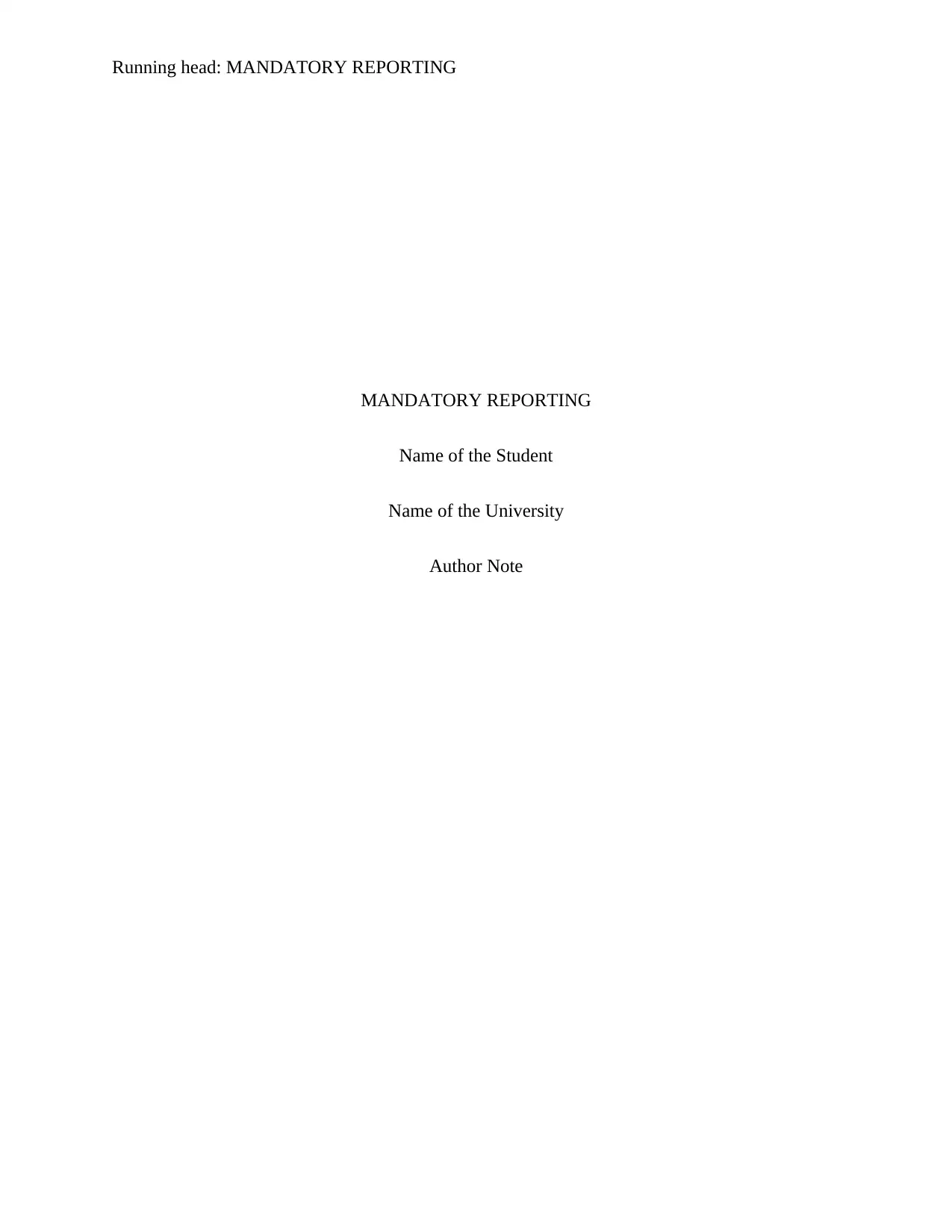
Running head: MANDATORY REPORTING
MANDATORY REPORTING
Name of the Student
Name of the University
Author Note
MANDATORY REPORTING
Name of the Student
Name of the University
Author Note
Paraphrase This Document
Need a fresh take? Get an instant paraphrase of this document with our AI Paraphraser
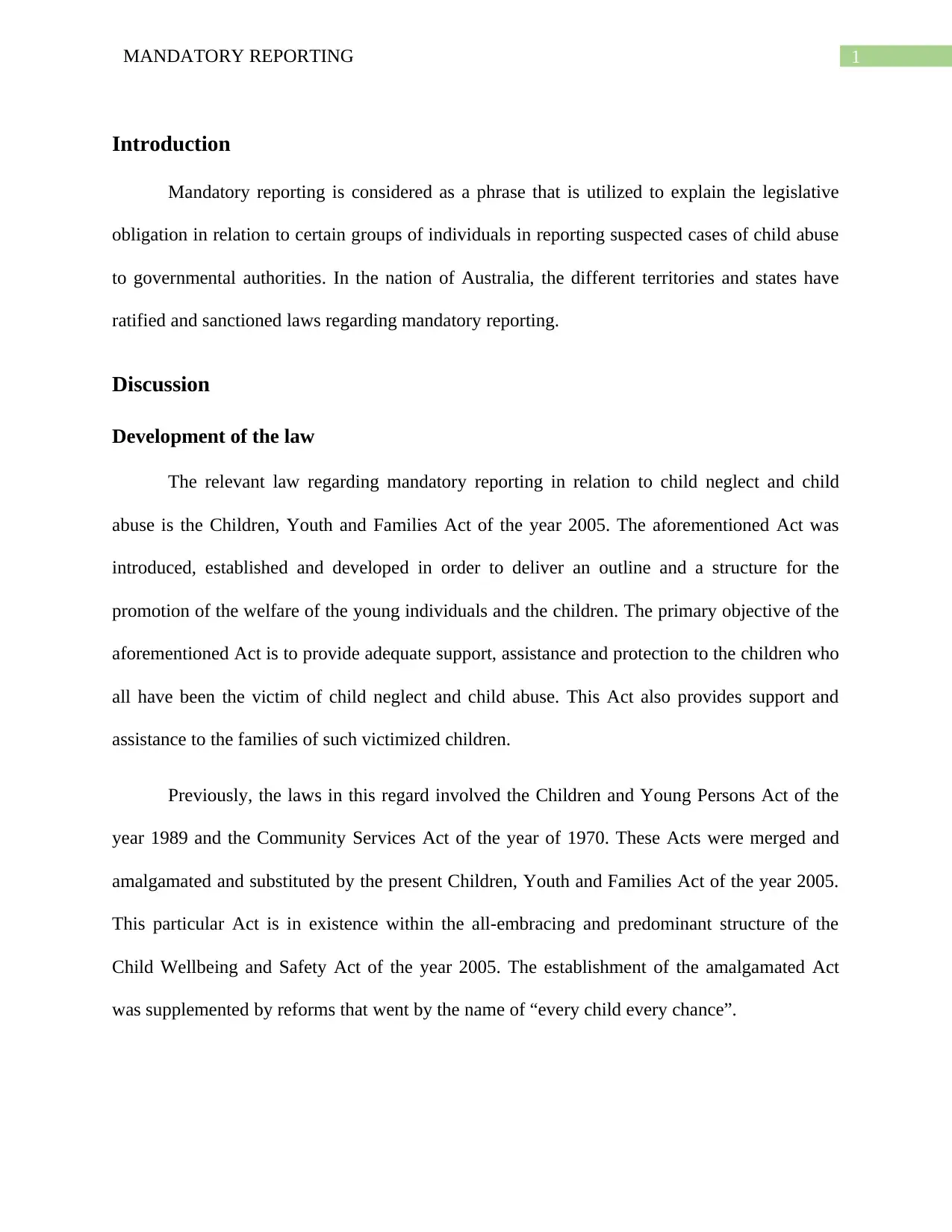
1MANDATORY REPORTING
Introduction
Mandatory reporting is considered as a phrase that is utilized to explain the legislative
obligation in relation to certain groups of individuals in reporting suspected cases of child abuse
to governmental authorities. In the nation of Australia, the different territories and states have
ratified and sanctioned laws regarding mandatory reporting.
Discussion
Development of the law
The relevant law regarding mandatory reporting in relation to child neglect and child
abuse is the Children, Youth and Families Act of the year 2005. The aforementioned Act was
introduced, established and developed in order to deliver an outline and a structure for the
promotion of the welfare of the young individuals and the children. The primary objective of the
aforementioned Act is to provide adequate support, assistance and protection to the children who
all have been the victim of child neglect and child abuse. This Act also provides support and
assistance to the families of such victimized children.
Previously, the laws in this regard involved the Children and Young Persons Act of the
year 1989 and the Community Services Act of the year of 1970. These Acts were merged and
amalgamated and substituted by the present Children, Youth and Families Act of the year 2005.
This particular Act is in existence within the all-embracing and predominant structure of the
Child Wellbeing and Safety Act of the year 2005. The establishment of the amalgamated Act
was supplemented by reforms that went by the name of “every child every chance”.
Introduction
Mandatory reporting is considered as a phrase that is utilized to explain the legislative
obligation in relation to certain groups of individuals in reporting suspected cases of child abuse
to governmental authorities. In the nation of Australia, the different territories and states have
ratified and sanctioned laws regarding mandatory reporting.
Discussion
Development of the law
The relevant law regarding mandatory reporting in relation to child neglect and child
abuse is the Children, Youth and Families Act of the year 2005. The aforementioned Act was
introduced, established and developed in order to deliver an outline and a structure for the
promotion of the welfare of the young individuals and the children. The primary objective of the
aforementioned Act is to provide adequate support, assistance and protection to the children who
all have been the victim of child neglect and child abuse. This Act also provides support and
assistance to the families of such victimized children.
Previously, the laws in this regard involved the Children and Young Persons Act of the
year 1989 and the Community Services Act of the year of 1970. These Acts were merged and
amalgamated and substituted by the present Children, Youth and Families Act of the year 2005.
This particular Act is in existence within the all-embracing and predominant structure of the
Child Wellbeing and Safety Act of the year 2005. The establishment of the amalgamated Act
was supplemented by reforms that went by the name of “every child every chance”.
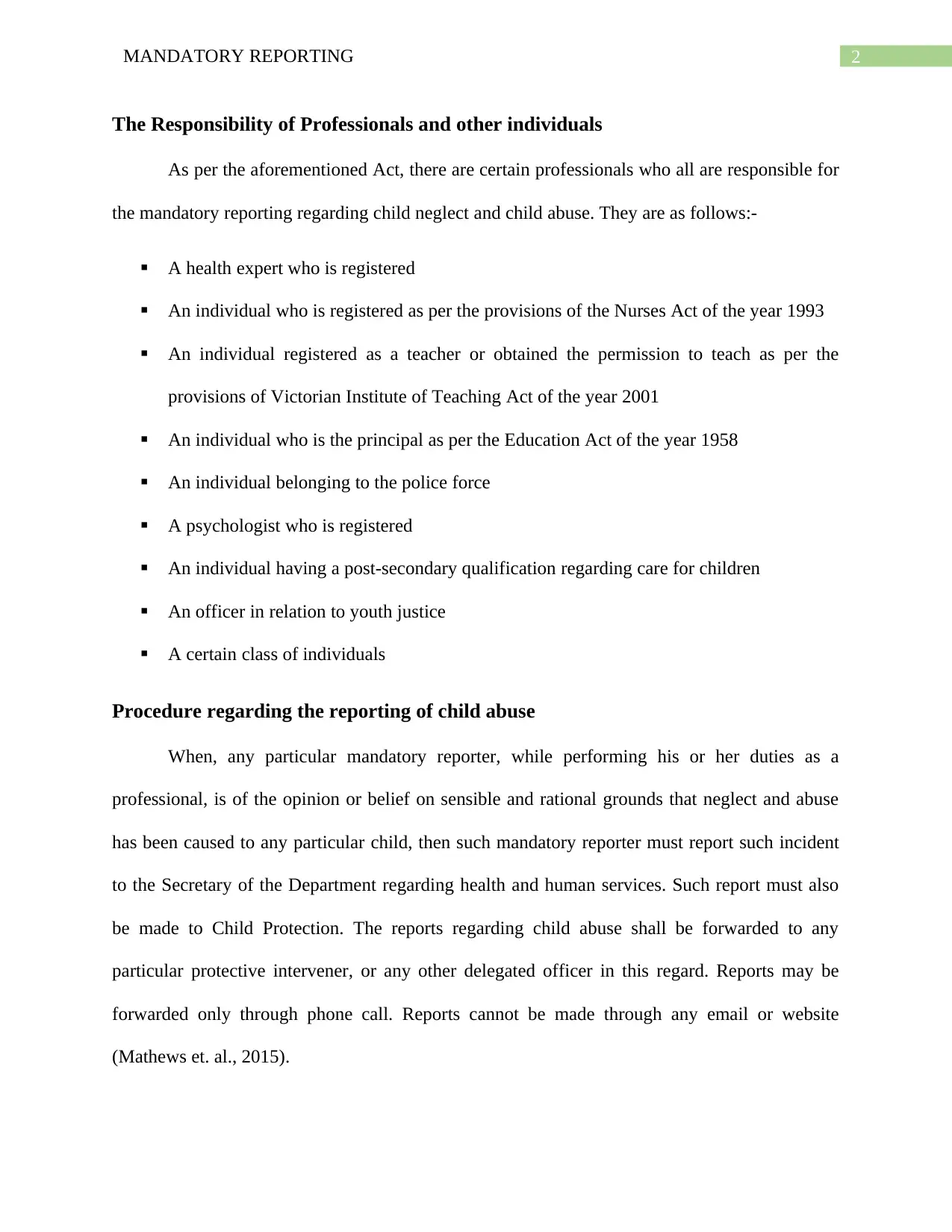
2MANDATORY REPORTING
The Responsibility of Professionals and other individuals
As per the aforementioned Act, there are certain professionals who all are responsible for
the mandatory reporting regarding child neglect and child abuse. They are as follows:-
A health expert who is registered
An individual who is registered as per the provisions of the Nurses Act of the year 1993
An individual registered as a teacher or obtained the permission to teach as per the
provisions of Victorian Institute of Teaching Act of the year 2001
An individual who is the principal as per the Education Act of the year 1958
An individual belonging to the police force
A psychologist who is registered
An individual having a post-secondary qualification regarding care for children
An officer in relation to youth justice
A certain class of individuals
Procedure regarding the reporting of child abuse
When, any particular mandatory reporter, while performing his or her duties as a
professional, is of the opinion or belief on sensible and rational grounds that neglect and abuse
has been caused to any particular child, then such mandatory reporter must report such incident
to the Secretary of the Department regarding health and human services. Such report must also
be made to Child Protection. The reports regarding child abuse shall be forwarded to any
particular protective intervener, or any other delegated officer in this regard. Reports may be
forwarded only through phone call. Reports cannot be made through any email or website
(Mathews et. al., 2015).
The Responsibility of Professionals and other individuals
As per the aforementioned Act, there are certain professionals who all are responsible for
the mandatory reporting regarding child neglect and child abuse. They are as follows:-
A health expert who is registered
An individual who is registered as per the provisions of the Nurses Act of the year 1993
An individual registered as a teacher or obtained the permission to teach as per the
provisions of Victorian Institute of Teaching Act of the year 2001
An individual who is the principal as per the Education Act of the year 1958
An individual belonging to the police force
A psychologist who is registered
An individual having a post-secondary qualification regarding care for children
An officer in relation to youth justice
A certain class of individuals
Procedure regarding the reporting of child abuse
When, any particular mandatory reporter, while performing his or her duties as a
professional, is of the opinion or belief on sensible and rational grounds that neglect and abuse
has been caused to any particular child, then such mandatory reporter must report such incident
to the Secretary of the Department regarding health and human services. Such report must also
be made to Child Protection. The reports regarding child abuse shall be forwarded to any
particular protective intervener, or any other delegated officer in this regard. Reports may be
forwarded only through phone call. Reports cannot be made through any email or website
(Mathews et. al., 2015).
⊘ This is a preview!⊘
Do you want full access?
Subscribe today to unlock all pages.

Trusted by 1+ million students worldwide
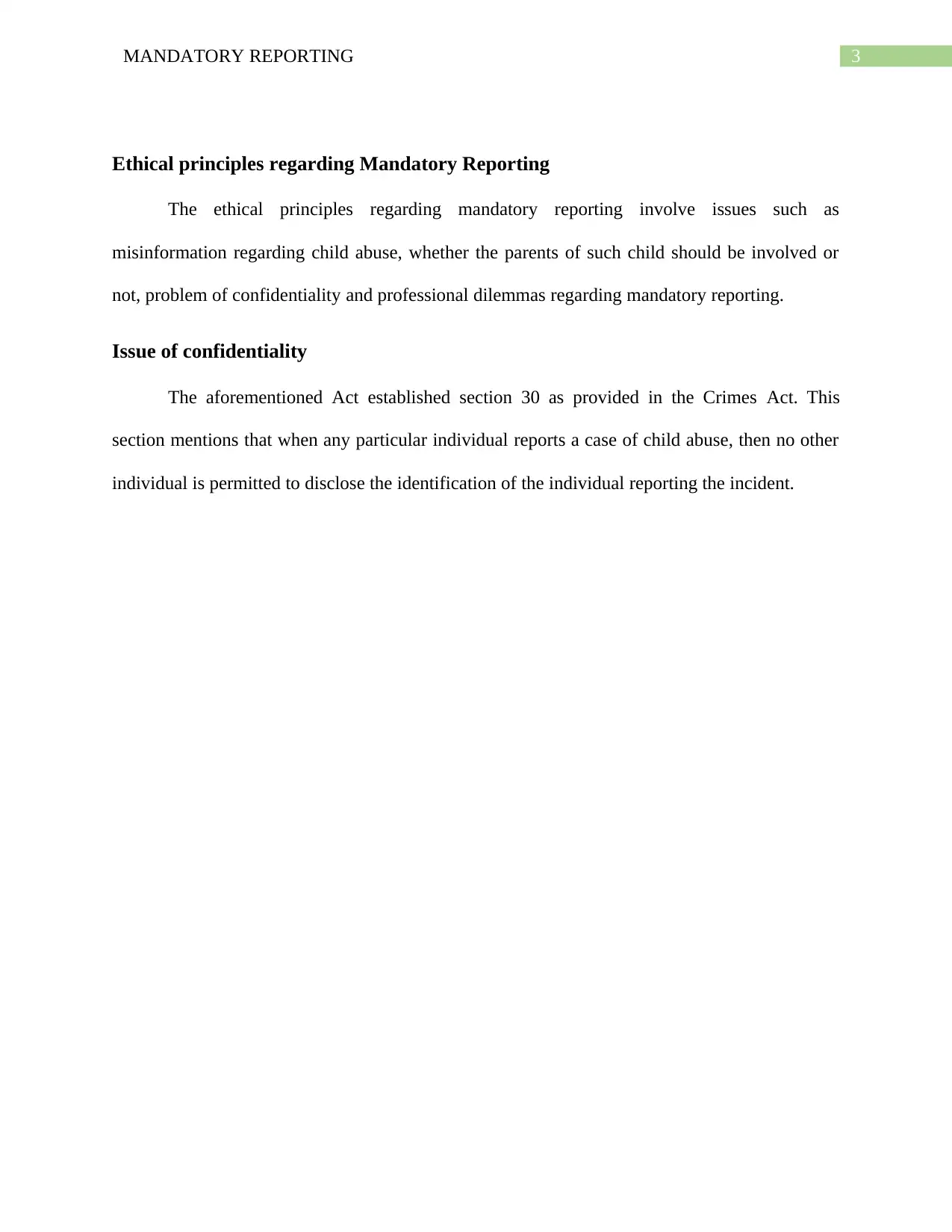
3MANDATORY REPORTING
Ethical principles regarding Mandatory Reporting
The ethical principles regarding mandatory reporting involve issues such as
misinformation regarding child abuse, whether the parents of such child should be involved or
not, problem of confidentiality and professional dilemmas regarding mandatory reporting.
Issue of confidentiality
The aforementioned Act established section 30 as provided in the Crimes Act. This
section mentions that when any particular individual reports a case of child abuse, then no other
individual is permitted to disclose the identification of the individual reporting the incident.
Ethical principles regarding Mandatory Reporting
The ethical principles regarding mandatory reporting involve issues such as
misinformation regarding child abuse, whether the parents of such child should be involved or
not, problem of confidentiality and professional dilemmas regarding mandatory reporting.
Issue of confidentiality
The aforementioned Act established section 30 as provided in the Crimes Act. This
section mentions that when any particular individual reports a case of child abuse, then no other
individual is permitted to disclose the identification of the individual reporting the incident.
Paraphrase This Document
Need a fresh take? Get an instant paraphrase of this document with our AI Paraphraser
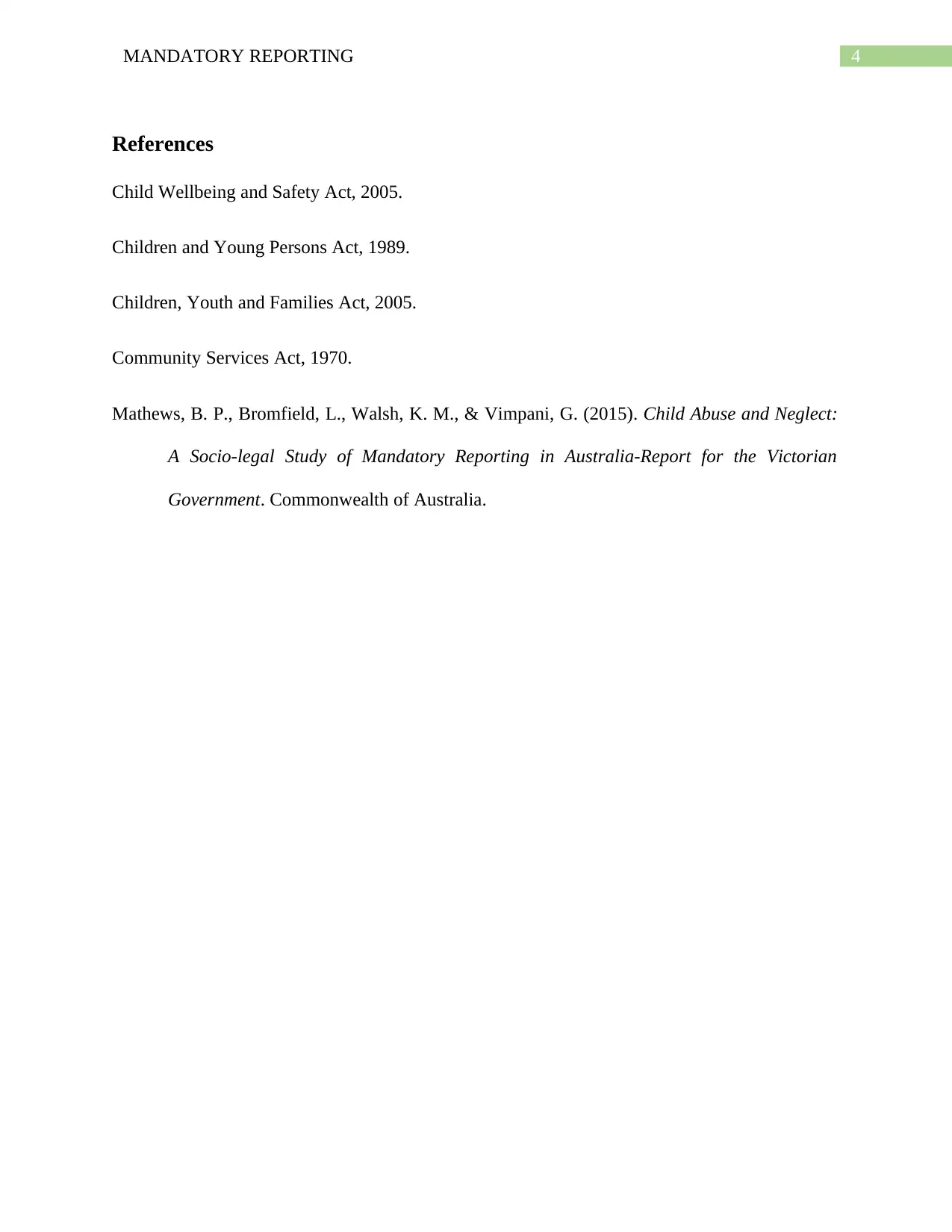
4MANDATORY REPORTING
References
Child Wellbeing and Safety Act, 2005.
Children and Young Persons Act, 1989.
Children, Youth and Families Act, 2005.
Community Services Act, 1970.
Mathews, B. P., Bromfield, L., Walsh, K. M., & Vimpani, G. (2015). Child Abuse and Neglect:
A Socio-legal Study of Mandatory Reporting in Australia-Report for the Victorian
Government. Commonwealth of Australia.
References
Child Wellbeing and Safety Act, 2005.
Children and Young Persons Act, 1989.
Children, Youth and Families Act, 2005.
Community Services Act, 1970.
Mathews, B. P., Bromfield, L., Walsh, K. M., & Vimpani, G. (2015). Child Abuse and Neglect:
A Socio-legal Study of Mandatory Reporting in Australia-Report for the Victorian
Government. Commonwealth of Australia.
1 out of 5
Related Documents
Your All-in-One AI-Powered Toolkit for Academic Success.
+13062052269
info@desklib.com
Available 24*7 on WhatsApp / Email
![[object Object]](/_next/static/media/star-bottom.7253800d.svg)
Unlock your academic potential
Copyright © 2020–2026 A2Z Services. All Rights Reserved. Developed and managed by ZUCOL.





